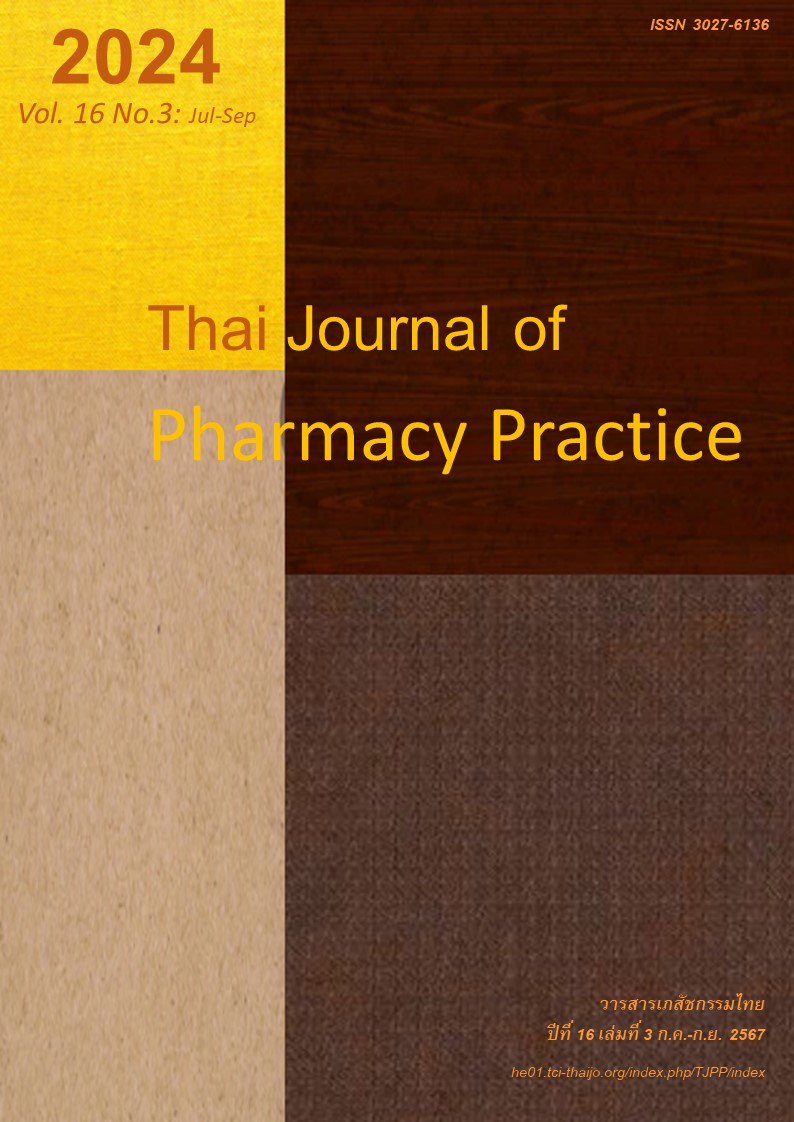สมรรถนะเภสัชกรด้านการบริหารจัดการระบบยากับการปฏิบัติงานของเภสัชกรของประเทศไทย
Main Article Content
บทคัดย่อ
วัตถุประสงค์: เพื่อศึกษาความสอดคล้องของสมรรถนะเภสัชกรด้านการบริหารจัดการระบบยา กับการปฏิบัติงานของเภสัชกรของประเทศไทย วิธีการ: งานวิจัยเชิงพรรณนาแบบภาคตัดขวางครั้งนี้ใช้แบบสอบถามออนไลน์สอบถามความคิดเห็นของเภสัชกรต่อสมรรถนะด้านการบริหารจัดการระบบยาที่ได้จากการทบทวนวรรณกรรมและผ่านการตรวจสอบความตรงเชิงเนื้อหาจากผู้เชี่ยวชาญทางเภสัชกรรม 21 ท่าน โดยวิธีเทคนิคเดลฟายแบบปรับปรุงจำนวน 2 รอบ สมรรถนะฯ ดังกล่าวประกอบด้วยสมรรถนะ 3 ด้าน ได้แก่ 1) การบริหารจัดการทั่วไปจำนวน 5 สมรรถนะและสมรรถนะเชิงพฤติกรรม 28 ข้อ 2) การบริหารระบบยาจำนวน 3 สมรรถนะและสมรรถนะเชิงพฤติกรรม 13 ข้อ และ 3) การนำและการอภิบาลจำนวน 5 สมรรถนะและสมรรถนะเชิงพฤติกรรม 17 ข้อ สมรรถนะแต่ละข้อประกอบด้วยสมรรถนะเชิงพฤติกรรมระดับต้นและระดับสูง คำถามประเมินความสอดคล้องของสมรรถนะเชิงพฤติกรรมจำนวน 58 ข้อ กับการปฏิบัติงานของเภสัชกร เป็นคำถามมาตราส่วนประมาณค่าแบบ Likert 4 ระดับ (มากที่สุด ถึง น้อยที่สุด) ผลการวิจัย: เภสัชกรตอบแบบสอบถามทั้งหมด 386 ราย ประกอบด้วยเภสัชกรโรงพยาบาล 254 ราย (ร้อยละ 65.80) เภสัชกรการตลาด 71 ราย (ร้อยละ 19.17) เภสัชกรชุมชน 33 ราย (ร้อยละ 8.55) เภสัชกรในงานคุ้มครองผู้บริโภค 21 ราย (ร้อยละ 5.44) และเภสัชกรฝ่ายผลิต 7 ราย (ร้อยละ 1.81) สมรรถนะเชิงพฤติกรรม 51 ข้อ (ร้อยละ 87.93) มีความสอดคล้องกับการปฏิบัติงานของเภสัชกร สมรรถนะเชิงพฤติกรรมที่ไม่สอดคล้องกับการปฏิบัติงานมีจำนวน 7 ข้อ ได้แก่ สมรรถนะที่เกี่ยวข้องกับ การบริหารจัดการการเงินการคลัง, การจัดซื้อจัดจ้างและการบริหารจัดการห่วงโซ่อุปทาน และการนำนโยบายสุขภาพของประเทศไปสู่การปฏิบัติ กลุ่มตัวอย่างที่ประเมินว่าไม่สอดคล้องมีแนวโน้มที่จะเป็นเภสัชกรปฏิบัติงานที่ไม่มีตำแหน่งบริหารและกลุ่มที่ปฏิบัติงานในโรงงานผลิตยา สรุปผล: สมรรถนะเชิงพฤติกรรมด้านการบริหารจัดการระบบยาที่พัฒนาขึ้นมีความสอดคล้องกับการปฏิบัติงานของเภสัชกรในประเทศไทย สามารถนำไปพัฒนากำลังคนเภสัชกร
Article Details

อนุญาตภายใต้เงื่อนไข Creative Commons Attribution-NonCommercial-NoDerivatives 4.0 International License.
ผลการวิจัยและความคิดเห็นที่ปรากฏในบทความถือเป็นความคิดเห็นและอยู่ในความรับผิดชอบของผู้นิพนธ์ มิใช่ความเห็นหรือความรับผิดชอบของกองบรรณาธิการ หรือคณะเภสัชศาสตร์ มหาวิทยาลัยสงขลานครินทร์ ทั้งนี้ไม่รวมความผิดพลาดอันเกิดจากการพิมพ์ บทความที่ได้รับการเผยแพร่โดยวารสารเภสัชกรรมไทยถือเป็นสิทธิ์ของวารสารฯ
เอกสารอ้างอิง
Suttajit S, Suwannaprom P, Eakanunkul S. On account of manpower: pharmacy workforce in the complexity of healthcare system. Chiang Mai: Center for Community Drug System Research and Development, Faculty of Pharmacy, Chiang Mai University; 2018.
Suwannaprom P, Suttajit S, Eakanunkul S, Supapaan T, Kessomboon N, Udomaksorn K, Sakulbumrungsil R. Development of pharmacy competency framework for the changing demands of Thailand’s pharmaceutical and health services. Pharm Pract (Granada). 2020; 18: 2141. doi: 10.18549/Pharm Pract.2020.4.2141
Whiddett S, Hollyforde S. A practical guide to compe- tencies: how to enhance individual and organisa- tional performance. London: CIPD Publishing; 2003.
Udoh A, Bruno-Tomé A, Ernawati DK, Galbraith K, Bates I. The development, validity and applicability to practice of pharmacy-related competency frame- works: A systematic review. Res Social Admin Pharm. 2021; 17: 1697-718.
International Pharmaceutical Federation. FIP Global competency framework version 2 [online]. 2020 [cited Jul 27, 2021]. Available from: www.fip.org/ file/5127.
Pharmaceutical Society of Australia. National compe- tency standards framework for pharmacists in Australia [online]. 2016 [cited Nov 1, 2021]. Available from: www.psa.org.au/wp-content/uploads/2018/06 /National-Competency-Standards-Framework-for-Ph armacists-in-Australia-2016-PDF-2mb.pdf.
The Pharmaceutical Society of Ireland. Core compe tency framework for pharmacists [online]. 2013 [cited Nov 1, 2021]. Available from: www.thepsi.ie/Librarie s/Pharmacy_Practice/PSI_Core_Comp_Framework _Web_Version_Final.sflb.ashx.
Competency Development and Evaluation Group. A Framework for pharmacist development in general pharmacy practice [online]. 2007 [cited Nov 1, 2021]. Available from: www.codeg.org/fileadmin/codeg/pdf/ glf/GLF_October_2007_Edition.pdf.
Pharmacy Council of Thailand. Announcement of Pharmacy Council of Thailand No. 18/2012. Professional competency of 6-years Pharm D curriculum [online]. 2012 [cited Oct 26, 2021]. Available from: pharmacycouncil.org/share /file/file_ 265.pdf.
Pharmacy Council of Thailand. Announcement of Pharmacy Council of Thailand No. 8/2011. Professional competency of pharmaceutical care curriculum [online]. 2011 [cited Oct 26, 2021]. Available from: pharmacycouncil.org.
Pharmacy Council of Thailand. Announcement of Pharmacy Council of Thailand No. 6/2014. Professional competency of pharmaceutical science curriculum [online]. 2014 [cited Oct 26, 2021]. Available from: www.pharmacycouncil.org.
Pharmacy Council of Thailand. Announcement of Pharmacy Council of Thailand No. 20/2015. Professional competency of pharmaceutical consu- mer protection in public health curriculum [online]. 2015 [cited Oct 26, 2021]. Available from: pharma cycouncil.org/index.php?option=content_detail&view=detail&itemid= 670&catid=36.
DiPiro JT. Preparing for the next generation pharma cists. Pharm Pract (Granada). 2020; 18: 1988. doi: 10.18549/PharmPract.2020.2.1988.
American Society of Health-System Pharmacists. ASHP practice advancement initiative 2030: new recommendations for advancing pharmacy practice in health systems. Am J Health-Syst Pharm 2020; 7: 113-22.
Yamane T. Statistics: an introductory analysis. Singapore: Times Printer; 1973.
Srisuphan V, Suttajit S, Suwannaprom P, Plodpai P, Prapaso N, Anuratpanich L, et al. Pharmacy work force. In: Tantiviess S, Chamniandamrongkarn S, editors. Thai drug system. Nonthaburi: Health Systems Research Institute; 2021. p. 506-63.
Ministry of Public Health. Geographic information system for health resources [online]. 2021 [cited Aug 31, 2021]. Available from: gishealth.moph.go.th/healt hmap/gmap.php.
Eakanunkul S, Kaewboonsert C, Wongsampun N, Suwannaprom P. Knowledge and perceptions of hospital pharmacists towards biological products and biosimilar. Thai Journal of Pharmacy Practice 2015; 7: 60-72.
Japan Pharmaceutical Association. Japan Pharma ceutical Association lifelong learning support system [online]. 2012 [cited Oct 26, 2021]. Available from: www.nichiyaku.or.jp/action/wp-content/uploads/2012 /02/jpals_flyer.pdf.
Arakawa N, Yamamura S, Duggan C, Bates I. The development of a foundation-level pharmacy compe- tency framework: An analysis of country-level applicability of the global competency framework. Res Social Admin Pharm 2020; 16: 396-404.
Bruno AF. The feasibility, development and valida- tion of a global competency framework for pharmacy education [dissertation]. London: University College London; 2011.
South African Pharmacy Council. Competency stan- dards for pharmacists in South Africa [online]. 2018 [cited Oct 26, 2021]. Available from: www.mm3 admin.co.za/documents/docmanager/0C43CA52-12 1E-4F58-B8F6-81F656F2FD17/00126360.pdf.
Suwannaprom P, Suttajit S, Plodpai P,Prapaso N, Sirsuphan V. Pharmacy workforce: a call for profes- sional cohesion to meet the rising healthcare demand. Journal of Health Science. 2020; 29: S141-152.


